No saben ustedes, queridos humornautas, cómo disfruto esta sección “Vis a vis con la vis cómica”. Cada vez que tengo el privilegio de conversar aquí con grandes humoristas de este Planeta, me siento feliz, además de honrado porque hayan aceptado compartir un poco de su tiempo con nosotros.
En ese caso contamos con un buen amigo, Aziz Yavuzdoğan, caricaturista, periodista y escritor turco y además, Editor en jefe de la reconocida revista de humor internacional “FENAMIZAH”.
¿Qué información se puede dar de él, por si algún humornauta de Humor Sapiens no lo conoce? Por ejemplo, que en 1981, comenzó su carrera periodística en Estambul. Trabajó como director de arte para varios periódicos y revistas. Se retiró en 2008 siendo director de arte de las publicaciones suplementarias del periódico Milliyet y de la revista infantil Miço.
Sus caricaturas han aparecido en diversas publicaciones. Ilustró numerosos libros y portadas, haciendo contribuciones destacadas al diseño gráfico. Ha ganado varios premios.
Entre 1989 y 1994, trabajó en el norte de Chipre como diseñador gráfico y subdirector editorial de los periódicos KIBRIS y ORTAM.
Fue consultor de emisión para el programa de caricaturas de 13 episodios “Çizgili Program”, en el canal educativo Okul de la TRT (Radio y Televisión Turca).
Entre 2006 y 2013, fue miembro de la junta directiva y secretario de la Asociación de Caricaturistas de Turquía. Inauguró 10 exposiciones individuales de caricaturas y participó en numerosas exposiciones colectivas.
Ha publicado seis libros de caricaturas y dos libros de poesía.
Entre 2008 y 2010, se dedicó a la publicación literaria y lanzó las publicaciones forumedebiyat y FE Magazine.
Entre 2012 y 2018, comenzó a publicar FENAMİZAH, la primera revista internacional de humor de Turquía en plataformas digitales. La revista continúa existiendo con contribuciones de caricaturistas y escritores internacionales.
En octubre de 2014, Yavuzdoğan regresó a su ciudad natal, Eskişehir. Durante cinco años, preparó una revista de humor semanal para el periódico más antiguo de Eskişehir, Sakarya Gazetesi, y dibujó caricaturas editoriales diarias para su portada. También realizó talleres de caricaturas en el Centro Juvenil del Municipio Metropolitano de Eskişehir.
En 2018, fue nombrado “Caricaturista del Año en Eskişehir” en los “Premios Lo Mejor de 2018” otorgados por la Asociación de Arte de Eskişehir. En 2024, recibió el “Premio al bServicio del Humor” de la Asociación de Caricaturistas de Chipre.
Después de admirarnos con ese importante curriculum, vamos ya a comenzar este vis a vis.
PP: Querido Aziz, te presenté de manera muy formal, con muchos datos, pero prefiero que te presentes tú mismo. Cuéntame cómo te ves a ti mismo, cómo quieres que te conozcan.
AZIZ: Antes de compartir mi historia como humorista, me gustaría decir algunas cosas. Primero y ante todo, soy un ser humano. Nací en la región de Anatolia, como hijo de una familia turca, por la voluntad de Dios. Aunque estoy orgulloso de mis orígenes, no soy en absoluto racista. Me encanta aprender e investigar sobre las culturas no solo de esta geografía, sino también de Mesopotamia, Asia, Europa, África, América Latina y las tribus antiguas de otras islas.
Por ejemplo, las civilizaciones de la región de Anatolia, como los hititas, frigios y griegos, así como los sumerios, antiguos egipcios, mayas, incas, aztecas y vikingos, me cautivan particularmente. Tengo un gran respeto por todas las tribus que han vivido alguna vez en este mundo, tanto del pasado como del presente. Creo que nuestra forma de vida actual está construida y enriquecida por esas culturas antiguas.
De hecho, aunque muchas cosas han cambiado materialmente a lo largo de la historia, observo que las emociones humanas nunca han cambiado. Por ejemplo, a partir de las tablillas que hemos descifrado, sabemos que los sumerios tenían un poeta llamado "Lu-dingira." En uno de sus poemas, describe su amor platónico y los poemas que escribió para la chica. Un día, reúne el valor para confesarle su amor en el parque de su ciudad. Sin embargo, recibe una respuesta negativa porque la chica ya está comprometida. Y así, el poeta Lu-dingira experimenta la desilusión. Destruye todos los poemas que había escrito sobre ella hasta ese día. ¿Puedes imaginar que el estado emocional de un joven de nuestra época sea muy diferente a este?
De todos modos, este tema podría extenderse mucho. Déjame continuar con tus otras preguntas...
PP: Bueno, de lo que sí estoy seguro es de que serías un maravilloso abuelo, porque debes saber miles de historias interesantísimas, ¿no es cierto? Ahora, para entrar en materia, dime, ¿cómo te interesaste en el humor y en las caricaturas?
AZIZ: Incluso cuando era muy joven, en una etapa en la que aún no había alcanzado plenamente la conciencia adulta, ya estaba involucrado con el arte. Un evento que ocurrió cuando estaba en cuarto grado de primaria (a los 9 años) me motivó aún más. Mi compañero de clase Mustafa dibujaba imágenes muy hermosas. Nuestro maestro elogió su trabajo y lo exhibió en el tablón de anuncios de la clase. Llámalo celos infantiles o admiración, pero empecé a dedicar más tiempo a dibujar yo mismo. En la secundaria, gané premios en competiciones escolares. Estudié en el Departamento de Pintura de Bellas Artes. Sin embargo, mi pasión por las caricaturas superó todo lo demás. Seguía todas las publicaciones de caricaturas/humor. En Turquía, Estambul es el centro de los medios, humoristas y escritores. Yo vivía en la capital, Ankara. Mi sueño siempre había sido ejercer mi profesión en Estambul. Y, en resumen, esto se hizo realidad en 1981.
PP: ¡Vivan los celos infantiles entonces, si esa fue la causa de tu motivación a nuestro mundo del humor! Como celos tuve yo al conocerte, lo confieso, cuando tuve ante mí tu excelente Revista FENAMIZAH. Por eso quiero que le cuentes a nuestros lectores sobre esa gran creación tuya. ¿Cómo surgió FENAMIZAH, cómo ha evolucionado, qué significa para ti, especialmente durante este segundo resurgimiento? ¿Qué te gustaría lograr con esta revista, que ya es tan importante?
AZIZ: Me jubilé de uno de los periódicos más grandes y antiguos de Turquía, Milliyet. Más tarde, obtuve un certificado de publicación personal. Mi primera publicación fue una revista literaria. (Porque desde mi infancia también tuve un gran interés en la literatura, y había trabajado como parte del equipo editorial en los periódicos y revistas donde trabajé). En la revista literaria que publiqué, incluí un suplemento llamado Fenamizah. En Turquía, la vida útil de las revistas literarias suele ser corta y su lectoría muy limitada.
Después de ilustrar y diseñar varios libros, hice la transición a la publicación digital en 2012, y nació Fenamizah. Continuó mensualmente sin interrupción hasta 2017. Sin embargo, debido a serios problemas de salud y familiares, tuve que hacer una pausa. Sin embargo, la chispa que estaba dentro de mí reapareció, y decidí continuar de nuevo. Muchas personas creen que esta revista es una publicación corporativa, pero, de hecho, preparo todo yo mismo (edición, corrección de estilo, diseño gráfico, comunicación con caricaturistas/responder mensajes, traducción, redacción, etc.) desde casa. Para mí, el éxito proviene del intenso interés y los amables comentarios que recibo de mis colegas internacionales. Eso es suficiente para mí. No tengo ambiciones comerciales ni deseos de hacerme famoso.
PP: Aunque no tengas entre tus objetivos ser famoso, lo eres, porque la fama viene sola cuando hay un gran trabajo detrás. Hablo de la fama “sana”. Pero teorizemos un poco. Por ejemplo, ¿cuál es tu opinión sobre las diferencias dentro del humor gráfico? ¿Es el humor gráfico un término "paraguas" que incluye caricaturas, dibujos personales, tiras cómicas, historietas, caricaturas editoriales, etc., o son estos conceptos distintos entre sí? Por ejemplo, ¿una caricatura o un dibujo son algo completamente diferente al humor gráfico? ¿La caricatura personal no forma parte del humor gráfico?
AZIZ: Creo que todos están bajo el mismo techo. Como los cuartos de una casa, cada uno con una función diferente. Es imposible colocar uno por encima del otro. Sí, cada casa tiene diferentes habitaciones, pero lo que realmente importa es la calidad de vida en esos cuartos. Así es como lo veo.
PP: Me gustó esa alegoría. Pienso igual que tú. Bueno, voy para otra arista… Sin duda, las mejores obras de humor gráfico son aquellas con una impecable elaboración, una ejecución sublime y un mensaje sólido que trasciende una simple sonrisa porque provocan reflexión... Pero quiero preguntarte: ¿qué obra tiene más valor para ti, una pieza perfectamente dibujada con un mensaje débil o una con un mensaje poderoso pero una ejecución más débil?
AZIZ: Ambas deberían complementarse entre sí. Lo que realmente le da valor a una obra, en mi opinión, no es el propio artista, sino si el público objetivo la acepta o puede comprenderla. No existe algo como una ejecución impecable. No importa cuánta dedicación pongas en tu trabajo, siempre habrá personas que encontrarán fallos. Por otro lado, por ejemplo, no dibujo con la intención de transmitir un mensaje. Si ya hay un fenómeno o un problema y la sociedad no lo ha notado, lo saco a la luz. La gente, en general, no gusta de que le den lecciones o mensajes. Si se va a transmitir un mensaje a la sociedad, debe hacerse con habilidad. Personalmente, no soy fan de dibujar cosas que se entiendan fácilmente. Prefiero que las personas piensen un poco, intenten comprender. Que hagan gimnasia mental. La poesía es así también. Un poeta turco dijo una vez: “No escribo poesía para que sea fácil de entender.”
PP: Permíteme una breve reflexión para complementar tu respuesta. Para mí, el humor inteligente es el que hace que el público se sienta inteligente al descifrar la obra. Así que estamos de acuerdo en que debe haber un grado de elaboración artística. Y los mensajes no pueden ser explícitos, porque serían consignas, eslóganes o moralejas y todo eso es lo contrario de lo que debe desear transmitir en su obra un artista (humorista en este caso). Y realizar la obra fea, antiestética, es desperdiciar el contenido, porque lo normal es que el público la rechace. En fin, el tema da para hacer otro vis a vis, ¿no es cierto? Pero sigamos más o menos en esa zona… ¿Tiene valor una obra que simplemente busca hacer reír o sonreír a alguien?
AZIZ: Esa es otra gran pregunta. En realidad, creo que la persona que crea humor y quien lo encuentra deben encontrarse en la misma frecuencia. En otras palabras, la capacidad de percibir es lo que importa aquí. Un humorista no debería preocuparse por si su obra es entendida por todos. Los que entienden, entienden. Los que no, deberían cuestionar su propia percepción. Aquí, el concepto de "valor" se vuelve importante cuando el artista y el lector coinciden en la misma frecuencia. La obra puede ser algo que simplemente les haga reír y seguir adelante, o algo que los haga reír mientras piensan/piensan mientras ríen.
PP: Esa es una buena respuesta. Estoy de acuerdo también. Si alguien necesita solo reír en un momento, sería fantástico que encuentre la obra del humorista que solo se planteó hacer reír. Todos beneficiados. Hay momentos para todo en la vida. Ahora una duda, ¿un humorista nace con humor en su ADN, o lo desarrolla con el tiempo?
AZIZ: Creo que Dios ha creado a cada persona con capacidades iguales. Todo lo que llamamos "innato" existe en cada ser humano. Simplemente debe haber un detonante que lo active. En otras palabras, una persona debe explorarse a sí misma en el campo que elija y trabajar hacia ese objetivo. El llamado talento existe en todos. Lo que importa es descubrirlo, sacarlo a la superficie y esforzarse. Pensemos en nuestro planeta. Por ejemplo, hay riquezas minerales subterráneas. Sin embargo, están ubicadas a diferentes profundidades. Nosotros, como humanos, somos iguales. Debemos descubrir las gemas preciosas ocultas en nuestras profundidades y hacerlas útiles.
PP: También de acuerdo. Pero si descubres tu talento y no haces nada por cultivarlo, por desarrollarlo, por superarte, se queda solo en el “descubrimiento”. Bueno, querido Aziz, me siento obligado a preguntarte tu opinión sobre los límites del humor. ¿Existen límites? Y si los hay, ¿cuáles son?
AZIZ: Siempre hay un límite en el humor o en cualquier otro ámbito de discusión. Tendemos a pensar en el universo como infinito y sin límites, pero, por supuesto, esto es meramente una "creencia." No hay un conocimiento cierto al respecto. Mi límite está relacionado con mi sensibilidad hacia las religiones, los idiomas y las razas de las personas en el mundo. Soy deísta, pero creo que estos temas no deberían ser objeto de sátira.
PP: Claro que ese es un límite, la autocensura de índole ética. Pero también hay otros que imponen circunstancial o permanentemente las sociedades (léase, dictaduras, lo políticamente correcto, etc.). Ahora apelo tu visión y expertiz en este campo, ¿cómo evaluarías el nivel del humor gráfico hoy en Turquía, el resto del mundo y especialmente en América Latina?
AZIZ: Gracias por tus palabras sobre mi experiencia en mi profesión. Sin embargo, prefiero mantenerme humilde. Ahora, respondiendo a tu pregunta: creo que el nivel del humor gráfico en Turquía, el mundo y especialmente en América Latina es bastante exitoso. Sin embargo, no puedo decir que esto haya sido ampliamente apreciado por el público mundial. Pienso que la mayoría de las personas en el mundo no tienen la capacidad de entender el humor gráfico. Tienden a preferir caricaturas con un humor más local, contenido escrito y entretenimiento ligero. El humor gráfico, hoy en día, parece ser más relevante en competencias internacionales.
PP: Muy de acuerdo con tu respuesta (es un poco aburrido que siempre estemos de acuerdo, ¿no es cierto?). Bueno, amigo mío, ¿recuerdas alguna anécdota divertida, curiosa o ingeniosa que hayas vivido en tu carrera en el humor?
AZIZ: Sí, por supuesto. Como todo caricaturista, tengo mis propias memorias. Por ejemplo, a veces participo en eventos al aire libre haciendo caricaturas en vivo. Durante estos eventos, puedo escuchar a algunas personas del público pensando en voz alta. Mientras comentan sobre el dibujo que estoy haciendo, dicen cosas como: “¡No se parece en nada! ¡No es lo mismo!”
PP: Claro, he sido testigo de eso con otros colegas, ja, ja. Vamos ahora a algo más personal: en el ámbito del humor, ¿hay algo que aún te gustaría hacer o lograr que no hayas conseguido?
AZIZ: En realidad, no soy alguien insaciable. No tengo planes a mediano o largo plazo. Puede parecerte extraño, pero es como si actuara según la inspiración que me llega, como una revelación enviada por Dios a un profeta, respondiendo al entorno y las circunstancias que me rodean, siempre esforzándome por dar lo mejor de mí. Desde mi infancia, siempre soñé con ser periodista y editor, y ese sueño se cumplió. ¿Qué más podría pedirle a Dios?
PP: Sin dudas, es bastante cumplir nuestros sueños. Pero quizás se te podía haber ocurrido otro proyecto… Bueno, para ir finalizando, ¿hay alguna pregunta que desearías que te hubiera hecho, pero no lo hice? Si es así, hazla y respóndela tú mismo.
AZIZ: Eres muy bienvenido, y realmente aprecio la oportunidad de participar en esta conversación contigo. En ciertas situaciones, no es necesario conocer a una persona cara a cara para entenderla realmente. Se puede evaluar la dignidad y el valor de una persona a través del trabajo que crea y contribuye. Eres una de esas personas para mí. Estás haciendo un trabajo increíble en tu campo. Me alegra que ambos formemos parte de un esfuerzo humano compartido.
PP: Me sacas los colores a la cara, amigo mío, porque viniendo de ti esas palabras tienen mil veces más valor. Gracias, es un honor conocerte, apreciarte y estaré infinitamente agradecido que me publiques en tu Fenamizah y que hayas aceptado este vis a vis… Pero para cerrar de verdad, ¿podrías compartir algunas palabras con nuestros lectores de Humor Sapiens?
AZIZ: De hecho, el papel de Humor Sapiens es muy importante. Es una ventana no solo hacia América Latina, sino también hacia el mundo. Sin embargo, a través de esta ventana, no solo ves tu propia calle; también brindas la oportunidad de seguir el humor global. Con su rico contenido, es una publicación muy completa, y esto es muy significativo. La sigo atentamente y la encuentro muy beneficiosa. El periodista español, Francisco Puñal Suárez, ha hecho valiosas contribuciones a nuestra revista a lo largo de los años. Por ejemplo, no sabía de la revista de humor Hermano Lobo, publicada durante la era de Franco, hasta que Francisco me informó al respecto. Me brindó información crucial sobre este tema. En 2014, publiqué un artículo al respecto en Fenamizah. En el próximo número de febrero, planeo mencionar Hermano Lobo nuevamente en nuestra sección de "Revistas de Humor Antiguas del Mundo." Espero sinceramente y deseo la continuación de nuestra genuina colaboración en el ámbito del humor. Este deseo se aplica no solo a nuestra asociación, sino al humor de todos los países del mundo.
Por cierto, me emocionó saber que tu boletín se actualizará a partir de 2025. ¡Eso es realmente emocionante! Aprecio tus esfuerzos y deseo su longevidad y éxito.
PP: Gracias de nuevo de todo corazón, querido Aziz. Mucha salud y muchos éxitos para ti en este 2025!!
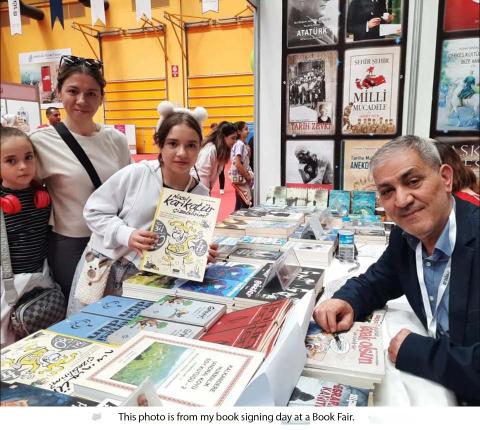
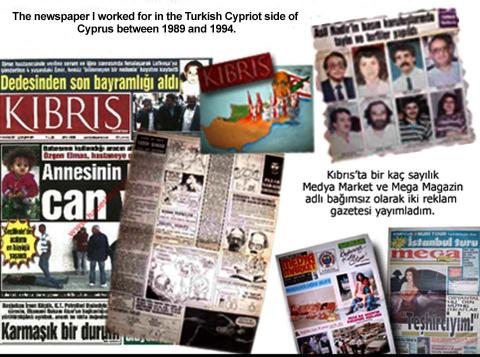
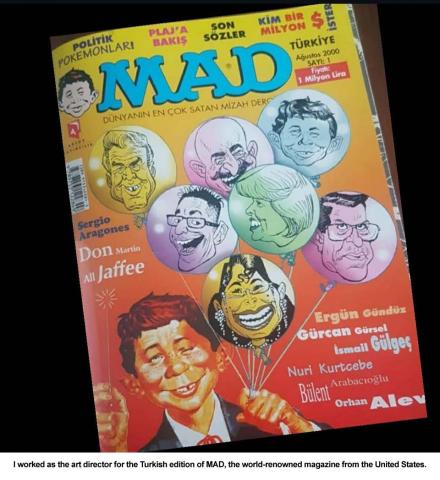
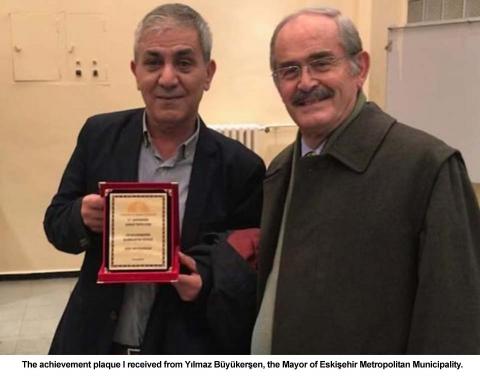
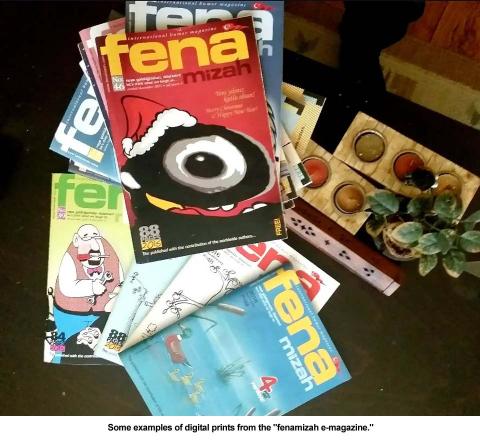
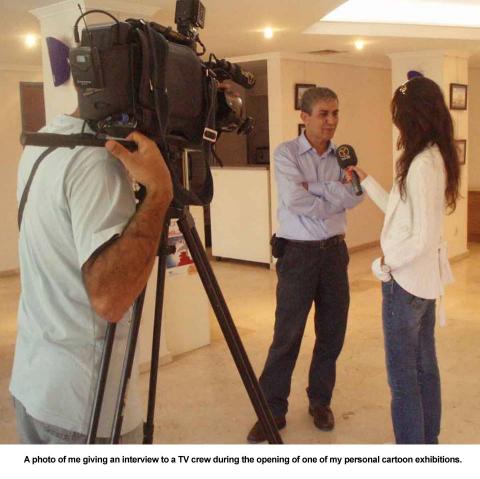
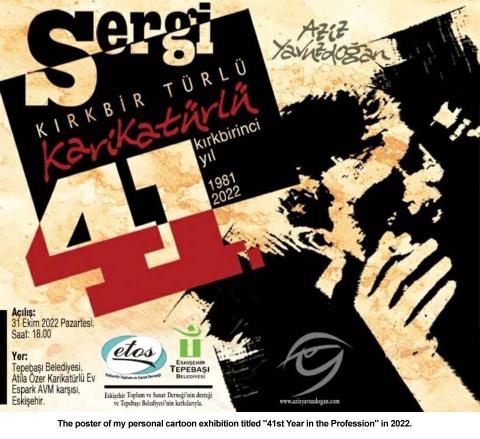
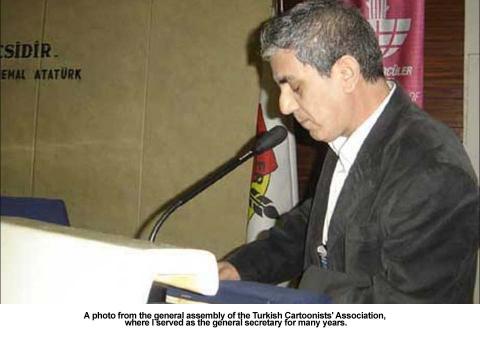
Interview with Aziz Yavuzdoğan
By Pepe Pelayo
You don't know, dear humornauts, how I enjoy this section “Vis a vis con la vis comedian”. Every time I have the privilege of talking here with great comedians on this Planet, I feel happy, as well as honored because they have agreed to share a little of their time with us.
In that case we have a good friend, Aziz Yavuzdoğan, a Turkish caricaturist, journalist and writer and also editor-in-chief of the renowned international humor magazine “FENAMIZAH”.
What information can be given about him, in case some humornaut from Humor Sapiens does not know him? For example, in 1981, he began his journalistic career in Istanbul. He worked as an art director for several newspapers and magazines. He retired in 2008 as art director of the supplementary publications of the newspaper Milliyet and the children's magazine Miço.
His caricatures have appeared in various publications. He illustrated numerous books and covers, making notable contributions to graphic design. He has won several awards.
Between 1989 and 1994, he worked in Northern Cyprus as a graphic designer and deputy editor-in-chief of the KIBRIS and ORTAM newspapers.
He was a broadcast consultant for the 13-episode cartoon program “Çizgili Program”, on the TRT (Turkish Radio and Television) educational channel Okul.
Between 2006 and 2013, he was a member of the board of directors and secretary of the Turkish Cartoonists Association. He inaugurated 10 individual exhibitions of caricatures and participated in numerous group exhibitions.
He has published six books of cartoons and two books of poetry.
Between 2008 and 2010, he dedicated himself to literary publishing and launched the publications forumedebiyat and FE Magazine.
Between 2012 and 2018, he began publishing FENAMİZAH, Türkiye's first international humor magazine on digital platforms. The magazine continues to exist with contributions from international cartoonists and writers.
In October 2014, Yavuzdoğan returned to his hometown, Eskişehir. For five years, he prepared a weekly humor magazine for Eskişehir's oldest newspaper, Sakarya Gazetesi, and drew daily editorial cartoons for its front page. He also held caricature workshops at the Eskişehir Metropolitan Municipality Youth Center.
In 2018, he was named “Eskişehir Cartoonist of the Year” at the “Best of 2018 Awards” by the Eskişehir Art Association. In 2024, he received the “Humor Service Award” from the Cyprus Cartoonists Association.
After admiring ourselves with that important resume, we are now going to begin this vis-à-vis.
PP: Dear Aziz, I introduced you in a very formal way, with a lot of information, but I prefer that you introduce yourself. Tell me how you see yourself, how you want to be known.
AZIZ: Before I share my story as a humorist, I would like to say a few things. First and foremost, I am a human being. I was born in the Anatolian region of the world, as a child of a Turkish family, by the will of God. While I am proud of my origins, I am absolutely not a racist. I love learning and researching the cultures of not only this geography but also those of Mesopotamia, Asia, Europe, Africa, Latin America, and the ancient tribes of other islands.
For example, the civilizations of the Anatolian region, such as the Hittites, Phrygians, and Greeks, as well as the Sumerians, Ancient Egyptians, Mayans, Incas, Aztecs, and Vikings, particularly captivate me. I have great respect for all the tribes that have ever lived on this earth, both past and present. I believe our current way of life is built upon and enriched by those ancient cultures.
Actually, although many things have changed materially throughout history, I observe that human emotions have never changed. For example, from the tablets we have deciphered, we know that the Sumerians had a poet named "Lu-dingira"; In one of his poems, he describes his platonic love and the poems he wrote for the girl. One day, he gathers the courage to confess his love to her in the park of his city. However, he receives a negative response because the girl is already engaged. And so, the poet Lu-dingira experiences disappointment. He destroys all the poems he had written about her up until that day. Can you imagine the emotional state of a young person in our time being any different from this?
Anyway, this subject could go onx for a long time. Let me continue with your other questions...
PP: Well, what I am sure of is that you would be a wonderful grandfather, because you must know thousands of very interesting stories, right? Now, to get into the subject, tell me, how did you get interested in humor and cartoons?
AZIZ: Even when I was very young, at an age when I hadn't fully reached adult consciousness, I was involved with art. An event that happened when I was in the 4th grade of elementary school (at the age of 9) motivated me even more. My classmate Mustafa was drawing very beautiful pictures. Our teacher praised his work and displayed it on the class bulletin board.
Let´s call it childish jealousy or admiration, but I started to dedicate more time to drawing pictures myself. In high school, I won awards in school competitions. I studied in the Fine Arts Painting Department. However, my passion for cartoons outweighed everything else. I was following all the cartoon/humor publications. In Turkey, Istanbul is the center for media, humorists, and writers. I was living in the capital, Ankara. My dream had always been to practice my profession in Istanbul. And in short, this became a reality in 1981.
PP: Long live childish jealousy then, if that was the cause of your motivation to our world of humor! I confess how jealous I was when I met you, when I had your excellent FENAMIZAH Magazine before me. That's why I want you to tell our readers about that great creation of yours. How did FENAMIZAH come about, how has it evolved, what does it mean to you, especially during this second resurgence? What would you like to achieve with this magazine, which is already so important?
AZIZ: I retired from one of Turkey´s major and oldest newspapers, Milliyet. Later, I obtained a personal publishing certificate. My first publication was a literary magazine. (Because I had also had a great interest in literature since my childhood, and I had worked as part of the editorial team in the newspapers and magazines I worked for.) In the literary magazine I published, I included a supplement called "fenamizah." In Turkey, the lifespan of literary magazines is usually short, and their readership is very limited. After illustrating and designing various books, I transitioned to digital publishing in 2012, and "Fenamizah"; was born. It continued monthly without interruption until 2017. However, due to serious health issues and family problems, I had to take a break. Yet, the spark that was within me reappeared, and I decided to continue again. Many people believe this magazine is a corporate publication, but in fact, I prepare everything on my own (editing, proofreading, graphic design, communication with cartoonists/responding to messages, translation, writing, etc.) from home. For me, success comes from the intense interest and kind comments I receive from my international colleagues. That is enough for me. I have no commercial ambitions or desire to become famous.
PP: Even if you don't have among your goals to be famous, you are, because fame comes alone when there is great work behind it. I'm talking about “healthy” fame. But let's theorize a little. For example, what is your opinion about the differences within graphic humor? Is graphic humor an "umbrella" term that includes caricatures, personal drawings, comic strips, comic strips, editorial cartoons, etc., or are these concepts distinct from each other? For example, is a cartoon or drawing something completely different from graphic humor? Isn't personal caricature part of graphic humor?
AZIZ: I believe they are all under the same roof. Like the rooms of a house, each serving a different function. It’s impossible to place one above the other. Yes, every house has different rooms, but what really matters is the quality of life in those rooms. That’s how I see it.
PP: I liked that allegory. I think the same as you. Well, I'm going to another angle... Without a doubt, the best works of graphic humor are those with impeccable elaboration, sublime execution and a solid message that transcends a simple smile because they provoke reflection... But I want to ask you: which work has more value to you, a perfectly drawn piece with a weak message or one with a powerful message but weaker execution?
AZIZ: Both should complement each other. What truly adds result/value to a work, in my opinion, is not the artist themselves, but whether the target audience accepts it or can comprehend it... There is no such thing as flawless craftsmanship. No matter how much care you put into your work, there will always be people who will find faults. On the other hand, for example, I don’t draw with the intention of delivering a message. If there’s already a phenomenon or an issue and society hasn’t noticed it, I bring it to light. People generally don’t like to be lectured or given messages. If a message is to be delivered to society, it must be done skillfully. Personally, I’m not a fan of drawing things that are easily understood. I prefer for people to think a little, try to understand. To do mental gymnastics.
Poetry is like that too. A Turkish poet once said, “I don’t write poetry so that it’s easily understood.”
PP: Allow me a brief reflection to complement your answer. For me, intelligent humor is what makes the audience feel intelligent when deciphering the work. So we agree that there must be a degree of artistic elaboration. And the messages cannot be explicit, because they would be slogans, slogans or morals and all that is the opposite of what an artist (humorist in this case) should want to convey in his work. And making the work ugly, unsightly, is wasting the content, because the normal thing is that the public rejects it. Anyway, the topic is something to do another look at, isn't it? But let's continue more or less in that area... Does a work that simply seeks to make someone laugh or smile have value?
AZIZ: That´s another great question. Actually, I think that the person creating humor and the one encountering it need to meet on the same frequency. In other words, the ability to perceive is what matters here. A humorist shouldn't worry about whether their work is understood by everyone. Those who understand, understand. Those who don’t should question their own perception. Here, the concept of "value" becomes important when the artist and the reader meet on the same frequency. The work can either be something they just laugh at and move on, or something that makes them laugh while thinking/thinking while laughing.
PP: That's a good answer. I agree too. If someone just needs to laugh at a moment, it would be fantastic for them to find the work of the comedian who only set out to make people laugh. Everyone benefited. There are times for everything in life. Now a question, is a comedian born with humor in his DNA, or does he develop it over time?
AZIZ: I believe that God has created every person with equal capabilities. Everything we call "innate"; exists in every human being. There must simply be a trigger that activates it. In other words, a person should explore themselves in the field they choose and work towards that goal. The so-called talent exists in everyone. What matters is discovering it, bringing it to the surface, and putting in the effort. Let’s think about our planet. For example, there are underground mineral riches. However, they are located at different depths. We, as humans, are the same. We must discover the precious gems hidden in the depths within us and make them useful.
PP: Also agree. But if you discover your talent and do nothing to cultivate it, to develop it, to improve yourself, it remains only a “discovery.” Well, dear Aziz, I feel compelled to ask your opinion on the limits of humor. Are there limits? And if there are, what are they?
AZIZ: There is always a limit to humor or any other area of discussion. We tend to think of the universe as infinite and boundless, but of course, this is merely a "belief." There is no certain knowledge on the matter. My limit is related to my sensitivity regarding the religions, languages, and races of the people of the world. I am actually an deist, but I believe that these matters should not be the subject of satire.
PP: Of course that is a limit, ethical self-censorship. But there are also others that are imposed circumstantially or permanently by societies (read, dictatorships, politically correct, etc.). Now I appeal to your vision and expertise in this field, how would you evaluate the level of graphic humor today in Türkiye, the rest of the world and especially in Latin America?
AZIZ: Thank you for your thoughts on my expertise in my profession. However, I still prefer to remain humble. Now, addressing your question; I believe the level of graphic humor in Turkey, around the world, and especially in Latin America is quite successful. However, I cannot say that this has been widely appreciated by the global public. I think the majority of the world's people do not have the capacity to understand graphic humor. They tend to prefer cartoons with more local humor, written content, and light-hearted entertainment. Graphic humor, nowadays, seems to be more relevant in international competitions.
PP: I very much agree with your answer (it's a bit boring that we always agree, isn't it?). Well, my friend, do you remember any funny, curious or witty anecdotes that you have experienced in your career in humor?
AZIZ: Yes, of course. Like every cartoonist, I have my own memories. For example, I sometimes participate in live portrait caricature drawing at outdoor events. During this time, I can hear some of the people in the crowd thinking out loud. While commenting on the drawing I’m doing, they say things like, "He doesn’t look like them at all! It’s not the same!".
PP: Sure, I've witnessed that with other colleagues, ha ha. Now let's get to something more personal: in the field of humor, is there something you would still like to do or achieve that you haven't achieved?
AZIZ: Actually, I’m not someone who is insatiable. I don’t have medium or long-term plans. It might seem strange to you, but it’s as if I act according to the inspiration that comes to me, like a revelation sent by God to a prophet, responding to the environment and circumstances around me, always striving to do my best. Since my childhood, I’ve always dreamed of being a journalist and a publisher, and that dream came true. What more could I ask from God?
12PP: To wrap up, is there a question you wish I had asked but didn’t? If so, please ask it now and answer it yourself.
AZIZ: You´re very welcome, and I truly appreciate the opportunity to engage in this conversation with you. In certain situations, it’s not necessary to meet a person face-to-face to truly know them. One can evaluate a person’s dignity and worth through the work they create and contribute. You are one of those people for me. You’re doing amazing work in your field. I’m glad we’re both part of a shared human effort.
PP: You bring out the color in my face, my friend, because coming from you those words have a thousand times more value. Thank you, it is an honor to know you, appreciate you and I will be infinitely grateful that you publish me in your Fenamizah and that you have accepted this vis a vis… But to really close, could you share a few words with our Humor Sapiens readers?
AZIZ: Indeed, the role of Humor Sapens is very important. It serves as a window not only to Latin America but also to the world. However, through this window, you don’t just see your own street; you provide the opportunity to follow global humor as well. With its rich content, it is a very comprehensive publication, and this is very significant. I follow it attentively and find it very beneficial. Spanish journalist friend, Francisco Punal Suarez, has made valuable contributions to our magazine over the years. For instance, I was unaware of the humor magazine Hermano Lobo, published during the Franco era, until Francisco informed me about it. He had provided me with crucial insights on this matter. In 2014, published an article about it in fenamizah. In the upcoming February issue, I plan to mention Hermano Lobo again in our section on "Old Humor Magazines of the World." I sincerely hope and wish for the continuation of our genuine collaboration in the field of humor. This wish applies not only to our partnership but to the humor of all countries around the world.
By the way, I was excited to hear that your newsletter will be updated starting in 2025.
That’s truly exciting! I appreciate your efforts and wish for its longevity and success.
PP: Thank you again with all my heart, dear Aziz. Good health and many successes for you in 2025!!

